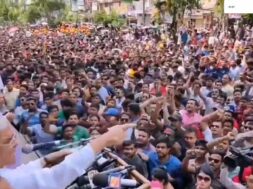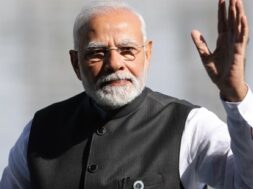
Roving Periscope: Would Bangladesh go the Sri Lanka way?
Virendra Pandit
New Delhi: With Bangladesh announcing an unprecedented fuel price hike by 52 percent last weekend, yet another of India’s neighbors might go the Sri Lankan way, while others like Pakistan, Nepal, and Myanmar also seem to inch their way into the expected global economic crisis later this year.
The case of Bangladesh is surprising because it was among the fastest growing economies worldwide, with a GDP worth USD 416 billion, as it became the largest textile manufacturer in the world.
On Saturday last, as soon as the Sheikh Hasina Wajed government increased the fuel prices, thousands of demonstrators hit the roads across several Bangladeshi cities, protesting against the sharpest fuel price hike since the nation’s independence from Pakistan in 1971.
According to some reports, increased fuel prices in recent weeks have led to severe power cuts and forced some 20 percent of businesses to suspend shop, leading to unemployment for many.
Irate demonstrators surrounded gas stations throughout the South Asian country, demanding a reversal of the price rise, which, officials maintained, had been done because of the crude price rise in the wake of the ongoing Russia-Ukraine war.
According to the media reports, Dhaka justified the price hike by saying it would reduce the nation’s subsidy burden. But experts say it would increase pressure on inflation, which is currently above 7 percent.
Amid dwindling foreign exchange reserves, the government has taken several measures, including curbing luxury goods imports.
The country’s foreign exchange reserves stood at USD 39.67 billion as of August 3, enough to cover only five months of imports and down from USD 45.89 billion a year earlier.
Rising energy and food costs because of the Russia-Ukraine conflict have inflated the country’s import bill, forcing the government to apply for loans from international institutions like the International Monetary Fund (IMF).
In Dhaka, official reports said the cost of petrol has increased by 51.2 percent to 130 takas (roughly INR108) per liter, the price of 95-octane petrol has increased by 51.7 percent to 135 takas (INR113), and that of diesel and kerosene has gone up by 42.5 percent.
Given the current global market conditions, this hike in fuel prices was unavoidable, officials said. The state-run Bangladesh Petroleum Corporation had lost over 8 billion takas (about INR 667 crore) on oil sales in the six months ending July.
“The new prices will not seem tolerable to everyone. But we had no other choice. People have to be patient,” Nasrul Hamid, Minister for Power, Energy and Mineral Resources, said on Saturday.
The prices would be readjusted if global prices fall, he said.
The main opposition Bangladesh Nationalist Party (BNP) Secretary-General Mirza Fakhrul Islam Alamgir, called the government’s action “rubbing salt in the wounds” and claimed it would have a disastrous effect on the economy.
The inflation rate in the country has remained above 6 percent for nine straight months, touching 7.48 percent in July, making it harder for poorer families to cover their daily expenses and increasing the likelihood of civil unrest.
Dhaka had last raised diesel and kerosene prices by 23 percent in November 2021, which prompted a nearly 30 percent rise in transport fares.
These developments in Bangladesh came when global oil prices have eased from their highs in recent weeks and closed on Friday at their lowest levels since February, rattled by worries a recession could hit fuel demand.
Benchmark Brent crude futures fell below USD 95 per barrel last Friday, down from a peak of USD 133.18 in March 2022.













